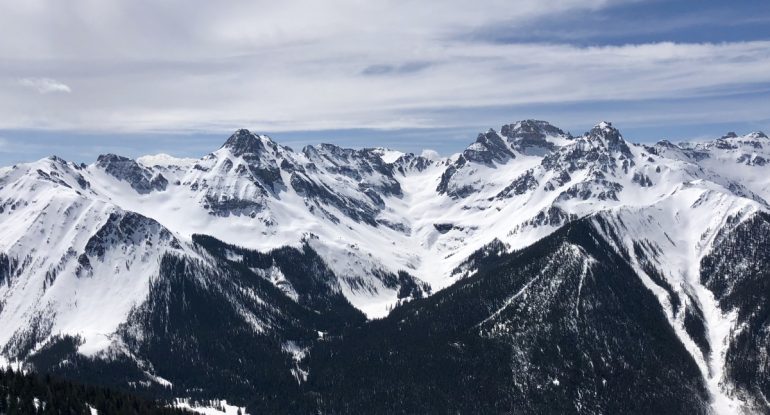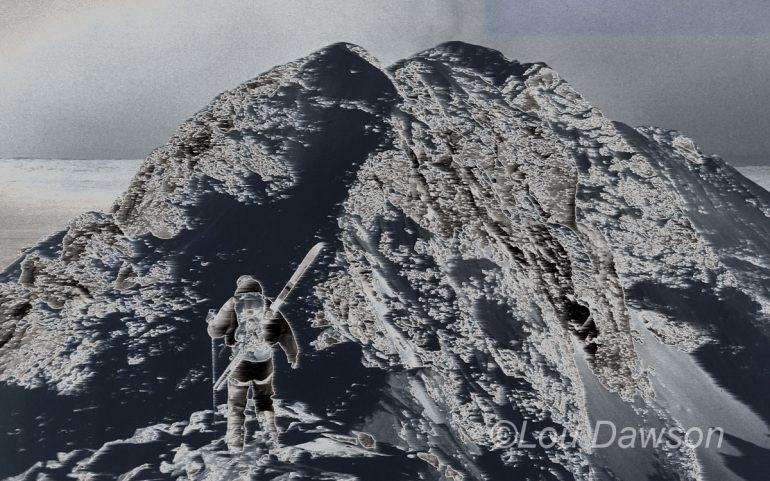
There are humbling moments, when things just don’t go as planned, that make up the other side of trip reports. The summer months are a perfect time to slow down and take a longer look at the defeats that advanced you as a ski mountaineer.
Throwback — to the ancient days of 1996, and subsequently from the archives of WildSnow. I’d finished skiing down all the Colorado fourteeners just a few years before. With a six-year-old child at home I’d transitioned to another chapter of life. Actually, transitioned is the wrong word, too gentle. It was more like I’d dragged myself by my own neck, moving from an entirely self-centered existence to being a husband and father (I can’t say I was a saint in that regard, but I tried). I was writing a column at the time, for Couloir Magazine. The words just spilled out. A little risky, writing philosophy when my normal beat was opinionated verbiage about gear. But people seemed to like it. Let us know what you think. -Lou
Colorado, 1996
Eventually the question will pop. A friend, workmate, or spouse will ask: Why, when we’ve created a society where one can exist with an incredibly low level of physical risk, do we mountaineers purposefully place ourselves in harms way? Why do we stretch to the limits of our stamina and sometimes risk our lives climbing and skiing mountains, when chairlifts and gondolas provide comfort? Why do we careen back down at speed instead of enjoying a safe and stately plod?
Perhaps your reason lies in the rewards of learning and mastery. Perhaps there is sanctification in piercing the veil of materialism. Perhaps you believe in heaven; perhaps you believe in heaven on earth. Whatever your faith, alpinism trashes morbid connections and plodding complacency. It gives rhythm to a sometimes pointless and scattered life.
I used to count how many rock climbs I could do in a month, how many miles I ran or how many peaks I skied. But I always felt tension between the numbers and less-quantifiable results. My biggest foray into bean counting was skiing down all 54 Colorado fourteeners. I knew such an indexed task would yield rewards — amazing experiences, enhanced career and reputation — but during the process I found it tough to focus on the sterile numeric and overtly material goals. Reaching the summit of a new peak, feeling vast distance beneath my feet, vibrating with the thrum of an edgy turn, muddling through the 1:00 am starts; all these things conspired to a deeper emotional and spiritual involvement. They were powerful experiences, but not because they were successes.
I recall a special failure. At 2:00am, we began our climb up the steep mountainside on Kit Carson Peak. Insulated from the normally cool Colorado night-sky by a light snowfall and cloud cover, the snowpack remained loose and wet. When my ski pole sunk to the hilt through bottomless muck, I realized this wasn’t our day. Still, I was tempted to push it. This was my chance for media glory. A Colorado news channel was to film us skiing the mountain. They were due to arrive via helicopter at first light.
Two voices wrangled in my skull. Continue into danger? Exit? Prudence won. For a moment, dejection crushed my soul, but it didn’t last. After packing up camp and retreating to our truck, we caught one of the most interesting and beautiful sunrises I’d ever seen. As the helicopter chattered above and I radioed the news of our nixed trip, the clouds broke over the vast ranch lands of the Wet Valley. Weird humps of fog clung to the ground like huge wet cotton balls. A golden, glowing shaft of light shot from the rising sun, skimmed through the mist and trees, and gave the tableau an otherworldly mood that made everyone pause for a moment and take stock. Combine failure with such beauty, and contemplation comes natural: Video? Who cares! Fifteen minutes of fame? Boring. New tires for the truck? Later. Why am I here? Now we’re talking. Does God exist? I feel an answer coming.
Let’s not make the elitist assumption that those of us who choose physical risk are any closer to life, or God, than anyone else. Perhaps we’re defective, and unlike normal people we must prod ourselves with “le extreme” to feel normal emotion. What’s more, perhaps risk, wilderness, and worldly beauty separate us from truth. You go to the wilderness, you feel spiritual. But that may be heroin for the soul.
One night, in a tent below a big mountain, a friend said to me, “I feel fulfilled when I’m on these trips, but I just can’t bring much of the feeling back with me, nor make it last very long.”
The intellectual part of the buzz is easy to keep: Just read Thoreau (or WildSnow.com?) and give cash to the Sierra Club or your favorite avalanche forecasting outfit. But when you return from the perfect trip, bills await, relationships pick up where they left off (sometimes in mid sentence). Amid a rapidly fading afterglow you’re planning the next trip, and the next, and the next. If they could sell it on the streets…
There is a powerful lesson in all this. We live in the material world — we participate. Snowboard and ski mountaineers glory in the world by grabbing it by the horns and wrestling with it. For a time in our lives we elevate materialism beyond shopping, to a purer level of us and the mountain, where nothing else exists. But perhaps someday you’ll need to look farther, because you’ve again become a shopper. That mountain top will be just another peak, the powder just another set of turns, the mountain range just another mall. When that day happens, reach for your summit of dreams, look past momentary fulfillment, and see terrain you can’t climb, can’t rappel, and can’t slide down, but terrain you nonetheless feel a deep need to explore. Terrain of the spirit. Mountains of marriage and family. Life of the mind. Creative pursuits. The essence of these lands will seep into your soul like the glow of warm granite as a new lesson rings in your mind: I can take this home. Then, with your mind and spirit opened up, perhaps the next time you do leave home for the alpine that next summit will feel like your first.
(Note, a version of this article was published in Couloir Magazine, Volume 11, #1 1996. It was ported to WildSnow a few years later.)
WildSnow.com publisher emeritus and founder Lou (Louis Dawson) has a 50+ years career in climbing, backcountry skiing and ski mountaineering. He was the first person in history to ski down all 54 Colorado 14,000-foot peaks, has authored numerous books about about backcountry skiing, and has skied from the summit of Denali in Alaska, North America’s highest mountain.

